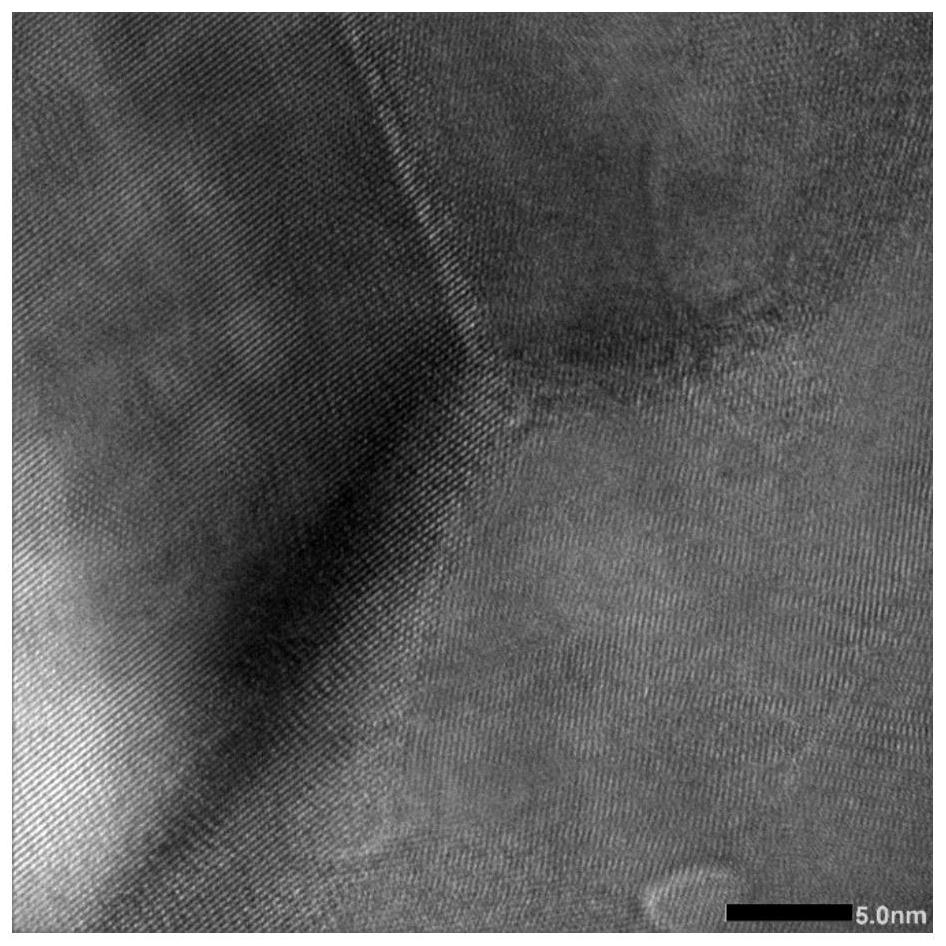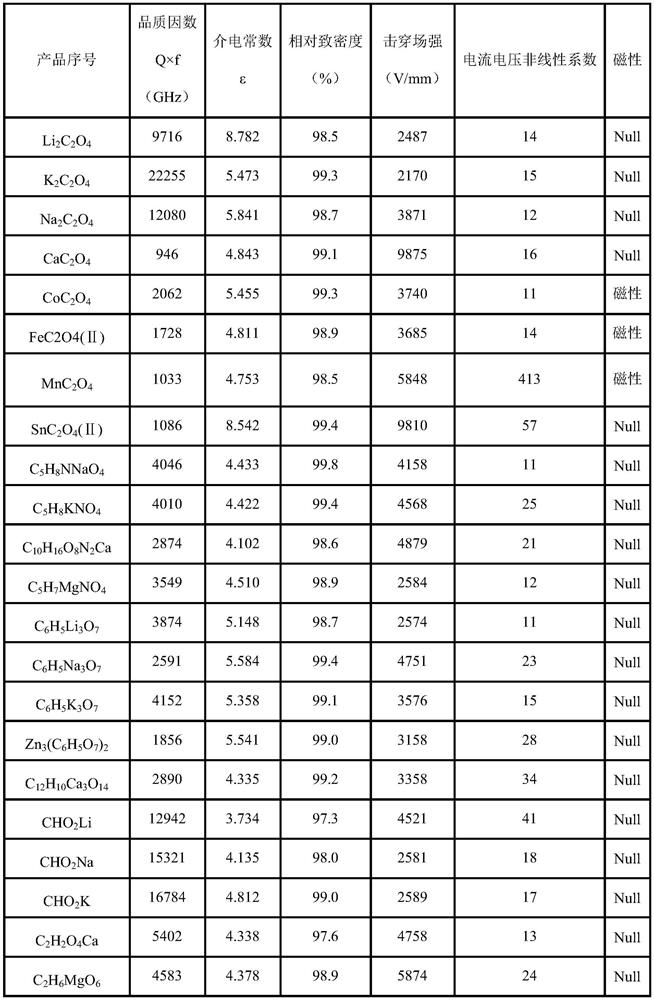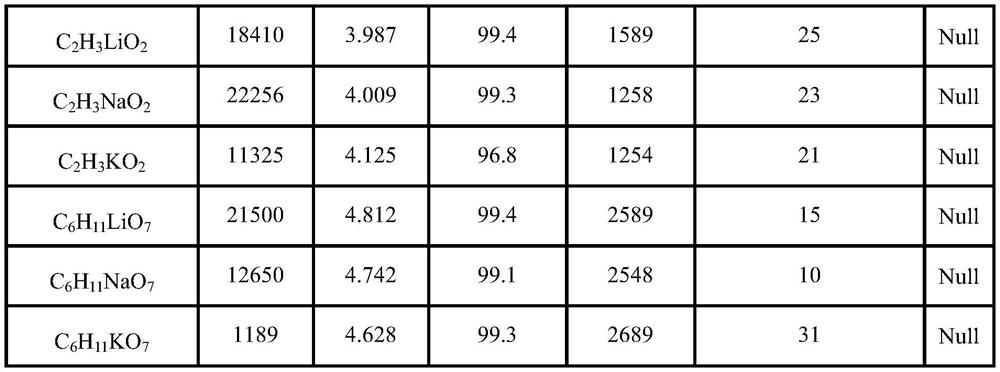A kind of electronic functional ceramics and its manufacturing method and application
A technology of functional ceramics and manufacturing methods, applied in the fields of resistance manufacturing, chemical instruments and methods, circuits, etc., can solve the problems of high prices of inorganic compounds and organic polymer materials, poor performance uniformity of ceramic products, and difficulty in precise control of formula ratios, etc. Achieve remarkable multi-functional electronic properties, DC voltage-sensitive properties, microwave dielectric properties, and low production costs
- Summary
- Abstract
- Description
- Claims
- Application Information
AI Technical Summary
Problems solved by technology
Method used
Image
Examples
Embodiment 1
[0036] MC 2 o 4 ·H 2 O (where M is Li, K, Na, Ca, Co, Fe(II), Sn); C 5 h 8 NNaO 4 ·H 2 O; C 5 h 8 KNO 4 ·H 2 O; C 10 h 16 o 8 N 2 Ca·H 2 O, C 5 h 7 MgNO 4 ·H 2 O; C 6 h 5 m 3 o 7 ·H 2 O (where M is Li, K, Na), Zn 3 (C 6 h 5 o 7 ) 2 ·H 2 O, C 12 h 10 Ca 3 o 14 ·H 2 O; CHO 2 M·H 2 O (where M is Li, K, Na), C 2 h 2 o 4 Ca·H 2 O, C 2 h 6 MgO 6 ·H 2 O; C 2 h 3 MO 2 ·H 2 O (where M is Li, K, Na); C 6 h 11 LiO 7 ·H 2 O (where M is Li, K, Na, respectively).
[0037] Step 1: The original splits are subjected to acetone wet ball milling;
[0038] Step 2: After wet ball milling for 8 hours, place the original powder in an oven at 50°C for 18 hours;
[0039] Step 3: Take the dried sample in Step 2 for grinding pretreatment;
[0040] No liquid phase auxiliary pretreatment. Take the various powders dried in step 2 and grind them separately for 10 minutes until the powder particles are flour-like to ensure uniform particle size and facil...
Embodiment 2
[0044] MC 2 o 4 4H 2 O (where M is Li, K, Na, Ca, Co, Fe(II), Sn); C 5 h 8 NNaO 4 4H 2 O; C 5 h 8 KNO 4 4H 2 O; C 10 h 16 o 8 N 2 Ca·H 2 O, C 5 h 7 MgNO 4 ·H 2 O; C 6 h 5 m 3 o 7 4H 2 O (where M is Li, K, Na), Zn 3 (C 6 h 5 o 7 ) 2 4H 2 O, C 12 h 10 Ca 3 o 14 4H 2 O; CHO 2 M·4H 2 O (where M is Li, K, Na), C 2 h 2 o 4 Ca·4H 2 O, C 2 h 6 MgO 6 4H 2 O; C 2 h 3 MO 2 4H 2 O (where M is Li, K, Na); C 6 h 11 LiO 7 4H 2 O (where M is Li, K, Na, respectively).
[0045] Step 1: The original splits are subjected to acetone wet ball milling;
[0046] Step 2: After wet ball milling for 8 hours, place the original powder in an oven at 80°C for 24 hours;
[0047] Step 3: Take the dried sample in Step 2 for grinding pretreatment.
[0048]Aqueous acetic acid assisted pretreatment. Take the various powders dried in step 2 and grind them separately for 20 minutes. During the grinding process, add 1.5mol / L acetic acid aqueous solution until t...
Embodiment 3
[0052] MC 2 o 4 2H 2 O (where M is Li, K, Na, Ca, Co, Fe(II), Sn); C 5 h 8 NNaO 4 2H 2 O; C 5 h 8 KNO 4 2H 2 O; C 10 h 16 o 8 N 2 Ca·2H 2 O, C 5 h 7 MgNO 4 2H 2 O; C 6 h 5 m 3 o 7 2H 2 O (where M is Li, K, Na), Zn 3 (C 6 h 5 o 7 ) 2 2H 2 O, C 12 h 10 Ca 3 o 14 2H 2 O; CHO 2 M·2H 2 O (where M is Li, K, Na), C 2 h 2 o 4 Ca·2H 2 O, C 2 h 6 MgO 6 2H 2 O; C 2 h 3 MO 2 2H 2 O (where M is Li, K, Na); C 6 h 11 LiO 7 2H 2 O (where M is Li, K, Na, respectively).
[0053] Step 2: After wet ball milling for 8 hours, place the original powder in an oven at 70°C for 20 hours;
[0054] Step 3: Take the dried sample in Step 2 for grinding pretreatment; deionized water assists in pretreatment. Take the various powders dried in step 2 and grind them separately for 15 minutes. During the grinding process, add deionized water one after another until the color of the powders deepens to ensure that the particles are evenly mixed with the acetic a...
PUM
| Property | Measurement | Unit |
|---|---|---|
| thickness | aaaaa | aaaaa |
Abstract
Description
Claims
Application Information
 Login to View More
Login to View More - R&D
- Intellectual Property
- Life Sciences
- Materials
- Tech Scout
- Unparalleled Data Quality
- Higher Quality Content
- 60% Fewer Hallucinations
Browse by: Latest US Patents, China's latest patents, Technical Efficacy Thesaurus, Application Domain, Technology Topic, Popular Technical Reports.
© 2025 PatSnap. All rights reserved.Legal|Privacy policy|Modern Slavery Act Transparency Statement|Sitemap|About US| Contact US: help@patsnap.com



